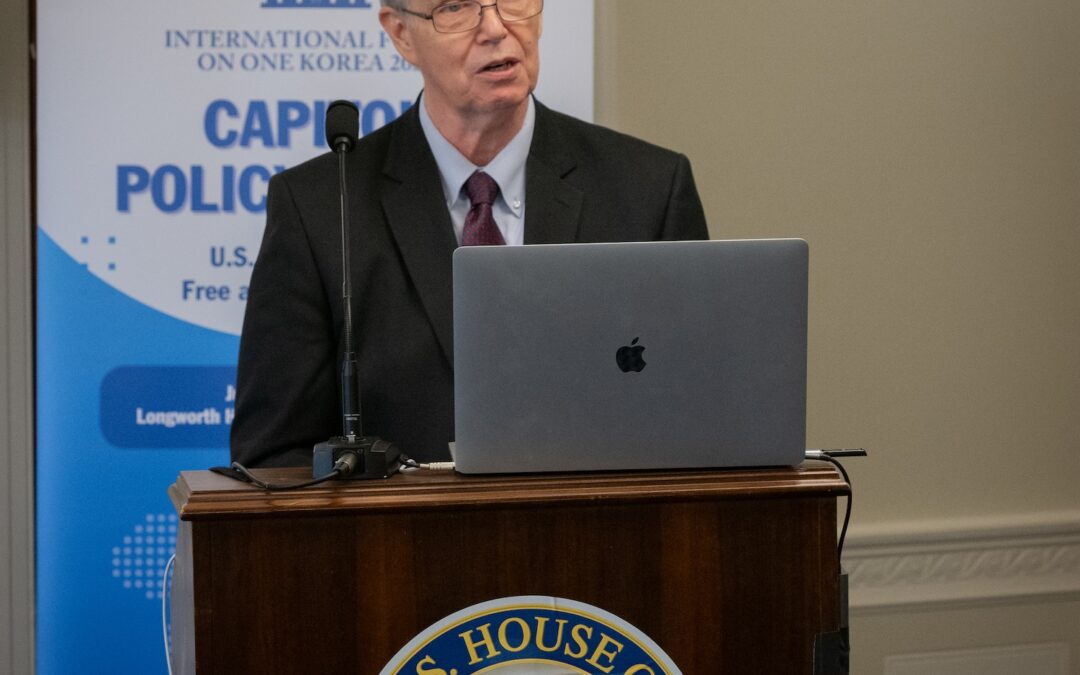A unified Korea in which the vision of the Korean Dream is given practical expression will be a new nation of high ideals. It will be a powerful witness to the fundamental principles expressed in the U.S. Declaration of Independence as well as be deeply rooted in its own historic cultural identity. In short, it will draw on the best lessons from the West while also looking to the ancient wisdom of Asia for new insights into the 21st century.
Dr. Hyun Jin Preston Moon
International Forum on One Korea, Seoul, October 2023
The unification of the Korean peninsula continues to build momentum on the international stage, inspiring collaboration between nations in the interest of regional and worldwide security. The United States, Japan, and Republic of Korea declared a trilateral partnership in August 2023 in which the governments expressed their commitment to fostering peace in the Indo-Pacific region and a unified Korea. Their joint statement declared, “We express support for the goal of the ROK’s Audacious Initiative and support a unified Korean Peninsula that is free and at peace.”
Korean reunification is not a new concept. The Korean people living in both the North and South have long lived through the pain of separation. The Korean Dream of a free and unified Korea that can benefit the region and world has been at the forefront of Dr. Hyun Jin P. Moon’s work for decades. The movement continues to build as world leaders recognize that peaceful reunification is essential to security and is being regarded by many policymakers as the best path forward.
This and more was discussed at the most recent International Forum on One Korea 2024 in Washington D.C. on June 6, 2024, organized by Global Peace Foundation (GPF). President of GPF, James Flynn, opened the forum by saying, “The power of ideas enables us to look beyond the way things are and to see totally different possibilities.” To this end, thought leaders from the U.S. participated in the discussion to develop a comprehensive U.S. strategy for a free and unified Korea centered on two key topics: the economic benefits of unification and the path forward to support the quest for change and peaceful unification through the lens of human rights and information sharing.
Esteemed speakers included a U.S. congressman and representatives from the Center for Asia Pacific Strategy, American Enterprise Institute, Woodrow Wilson Center, Northeast Asia Economics and Intelligence Advisory, International Council on Korean Studies, and Committee for Human Rights in North Korea, among others.
In the first panel, “Economic Considerations: Opportunities from Korean Unification,” speakers agreed that South Korea must be the driving catalyst for unification with support from the international community and institutions. One speaker stated that a free and unified Korea would benefit the world economy. He cautioned that if unification is to drive economic development, North Korea must be given the opportunity to develop its own companies rather than having outside companies forced upon it. Nevertheless, the panel concurred that now is the best time for unification, with human rights brought to the forefront.
“Operationalizing Government and Citizen Support for Korean Unification – Challenges – How to Create Conditions for Change in North Korea,” was the forum’s second panel discussion. Speakers highlighted transforming the region by addressing the human rights crisis in North Korea and focusing on getting information to the isolated people of North Korea.
One ambassador acknowledged that economic, political, military, and diplomatic dimensions are important to bringing peaceful reunification to the peninsula; however, upfront attention to human rights is the key to unification.
The Capitol Policy Forum: U.S. Support for a Free and Unified Korea highlighted the economic benefits associated with the unification of North Korea and South Korea. While unification will not be an easy task, it can be achieved through preparation, global support, information sharing, and a fervent desire to end human rights abuse in North Korea. The forum moderator, an American, adamantly stated that the international community must support the Korean people. He described all people as member of the same human family and therefore have a responsibility to help the peninsula and fulfill the Korean Dream together.
Read the full article on Global Peace Foundation. Global Peace Foundation is an international non-sectarian, non-partisan, nonprofit organization, which promotes an innovative, values-based approach to peacebuilding, guided by the vision of One Family under God. GPF engages and organizes a global network of public and private-sector partners who develop community, national, and regional peacebuilding models as the foundation for ethical and cohesive societies. Dr. Hyun Jin Preston Moon is the founder and chairman of the Global Peace Foundation.

